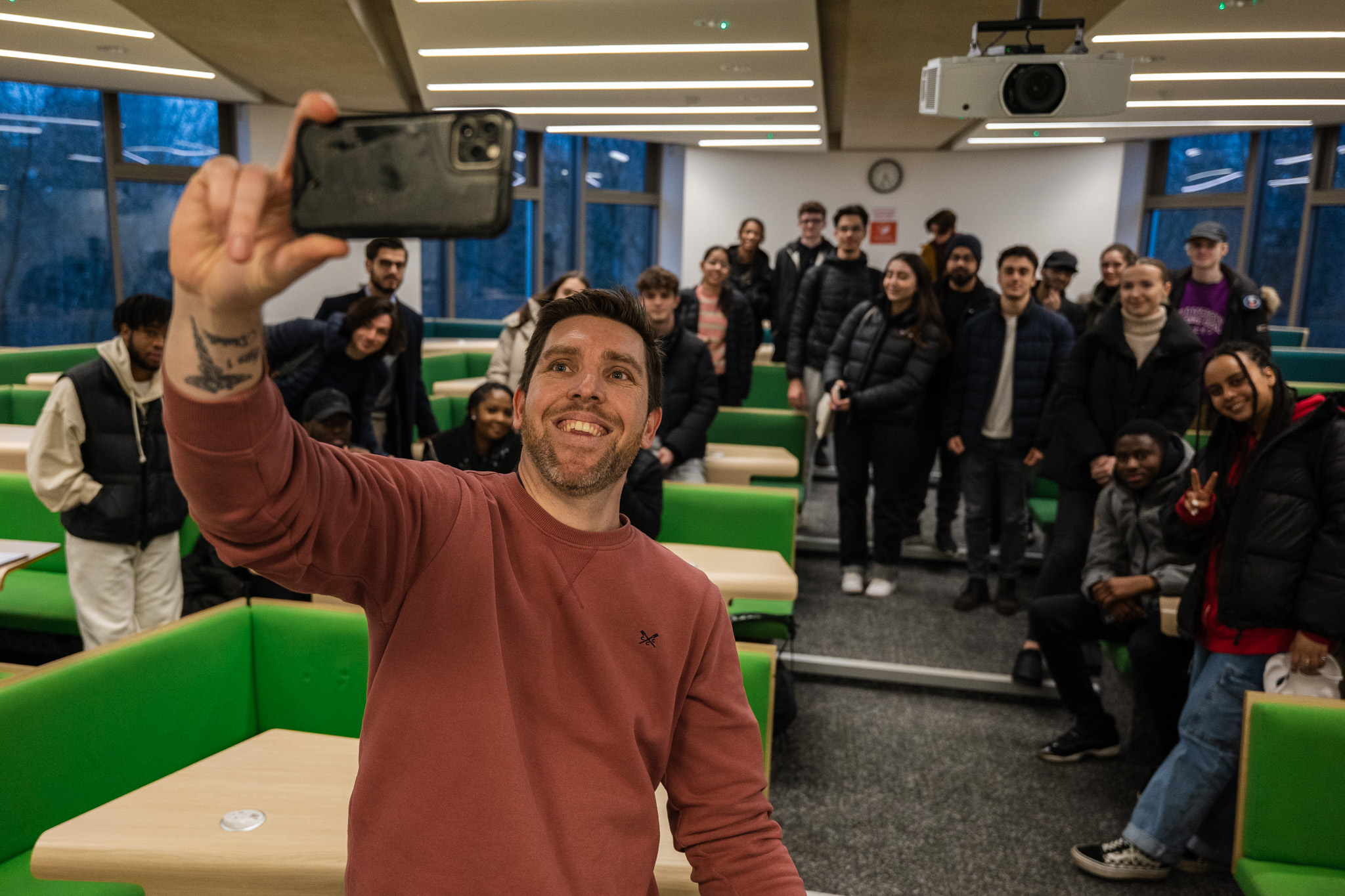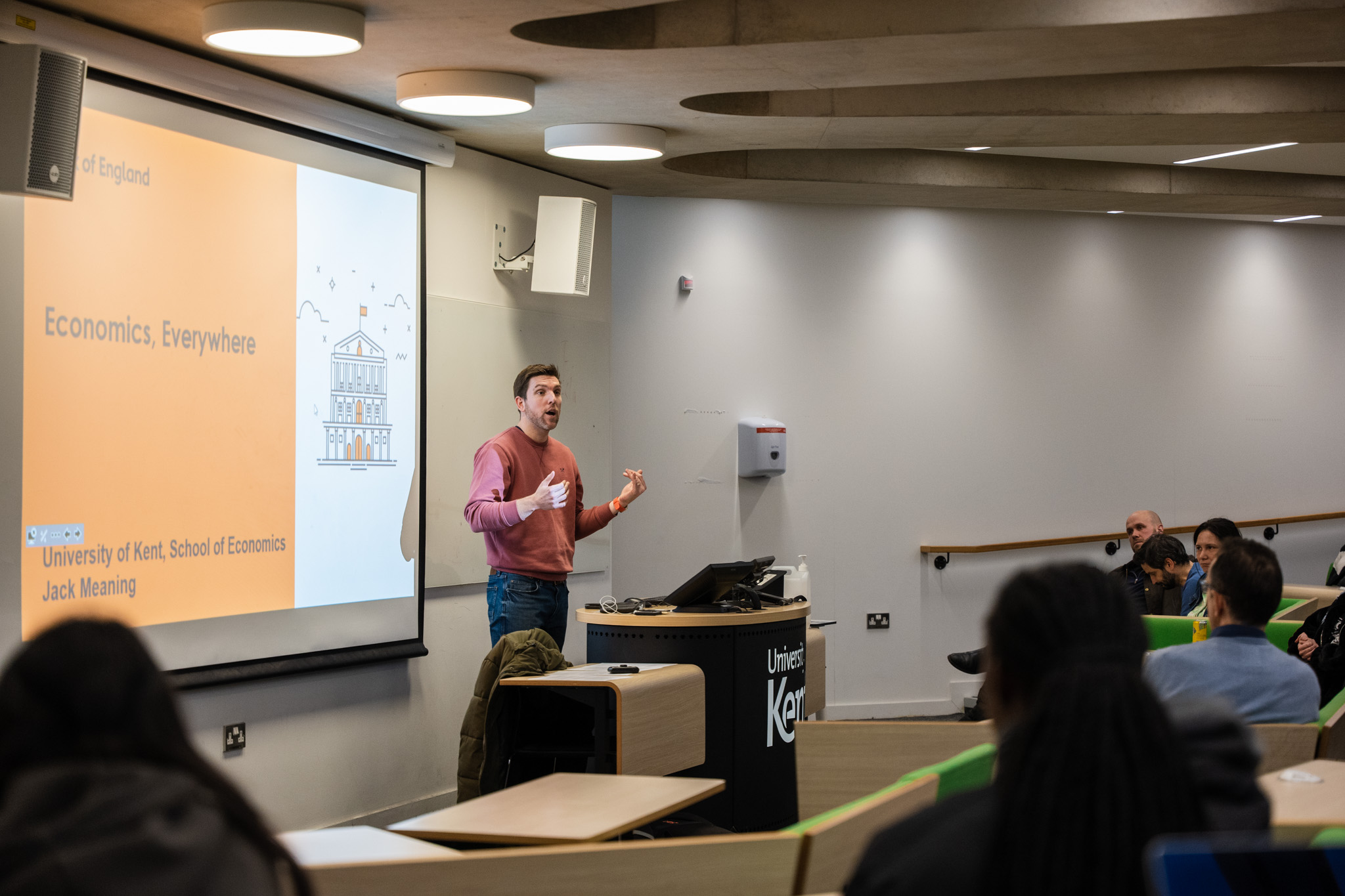Put ‘Jack Meaning’ into Google, and you end up with the search engine attempting to define the name ‘Jack’. True to his name, Jack is trying to bring about a greater universal understanding of economics.
As an esteemed School of Economics Alumnus, who currently works in the Monetary Analysis area of the Bank of England, and is author of the first ever Bank of England publication, pop-econ book ‘Can’t We Just Print More Money?’, the lecture theatre was filled to the brim, with bright-eyed students hoping to catch some of the capital his words carried.
Jack does not look like your archetypal economist. His friendly and easy-going manner bares the resemblance of a tidy musician holding an acoustic guitar at a local open mic night. He picked up on this point when talking about how people have a warped view of what economists look like – referencing a study by non-profit advocacy group Economy. The charity asked random people at a music festival to sketch their idea of an economist. He showed us 3 of them – all badly drawn white men, with a briefcase (something he saw as an indicator of a higher socio-economic background) with money on their mind. After the laughs had subsided, he used this study to illustrate the point of a perception problem with the bank – one of deep mistrust among the public.
He puts this mistrust down to a lack of understanding about the way the financial system works, with more than 50% of the country unaware of ‘everyday’ economic terms like GDP and inflation, as well as the difference between nominal and real wages. The responsibility of bridging the gap in understanding is one that he admits economists of the past have neglected. Jack quoted the former Bank of England Chief Economist (Andy Haldane) when saying that an economist that is good at communication looks at your shoes while giving an explanation, rather than their own.
The problem of communication manifests on all levels. He shared with students how economists in the Bank would hand senior staff 110-page reports on a daily basis. With busy workloads they did not have time to read through these colossal stacks of paper and brought in a rule of 6-page maximum, ensuring only the elemental essence was reported. And this was the crux of the issue – too much flexing and not enough de-complexing is going on in the economist community. “You can be a Nobel Laureate, but it is worthless without the ability communicate effectively” he told us with a humble smile.
The problem of access to the field was something that Jack felt personally. He grew up in a town on the Isle of Sheppey, in Kent, where the steel mill was essential to the local economy – one which closed during his childhood, bringing about financial hardship to many in the area. The people of his town did not have the words or tools to understand why this had happened, and he was driven to help fill this gap in knowledge.
The people of his town did not have the words or tools to understand why this had happened, and he was driven to fill this gap in knowledge. Coming to the University of Kent for his degree, enlightened Jack about the global economic forces at play, and how they impact everyday life. Things like choice of trainers, pick and mix, all the way up to climate threats can be understood through economics.
The all-encompassing explanations he found for human behaviour in the subject drove him to do a Masters in International Finance and Development Economics, which he followed with a PhD in Economics – both at the University of Kent.
Moving onto his experience at the Bank of England, Jack mentioned how the days of selection bias from a few top schools and universities were long past. The emphasis is now on diversity of background, with jobs at the Bank, although still very competitive, now highly accessible to those from any university. The aim behind this is to draw upon a wealth of life experiences. His attempt at getting a job at the central bank was only successful after being rejected several times. What had changed? The experience he gained outside of the bank, which continues to help him to set economic policy in his current role.
“Real world experience doesn’t have to come from JP Morgan or the like – it is just as important to hear from those with a background in charity and non-profits.” His advice to budding economists was to roll with the punches, as all the people he knew at the Bank had only been accepted after several application attempts. Another lesson that Jack shared was that although everything learned in class is useful, it is important to also remember to consider the limits of what is being taught. “All (economic) models are wrong,” he said with a shrug, “but some are useful.”
After reminiscing on sunny days spent in the Keynes area of our campus, he ended the talk on a quote from the veteran British economist, which outlines the qualities of a truly great economist. “The master-economist must possess a rare combination of gifts …. He must be mathematician, historian, statesman, philosopher — in some degree. He must understand symbols and speak in words. He must contemplate the particular, in terms of the general, and touch abstract and concrete in the same flight of thought. He must study the present in the light of the past for the purposes of the future. No part of man’s nature or his institutions must be entirely outside his regard. He must be purposeful and disinterested in a simultaneous mood, as aloof and incorruptible as an artist, yet sometimes as near to earth as a politician.”
Our thanks to Jack for remembering his Canterbury roots and the insight he is spreading in the world of economics.
For those who wish to find out more about economics without the burden of ‘big words’, try Economy’s ‘No jargon economic news‘.


